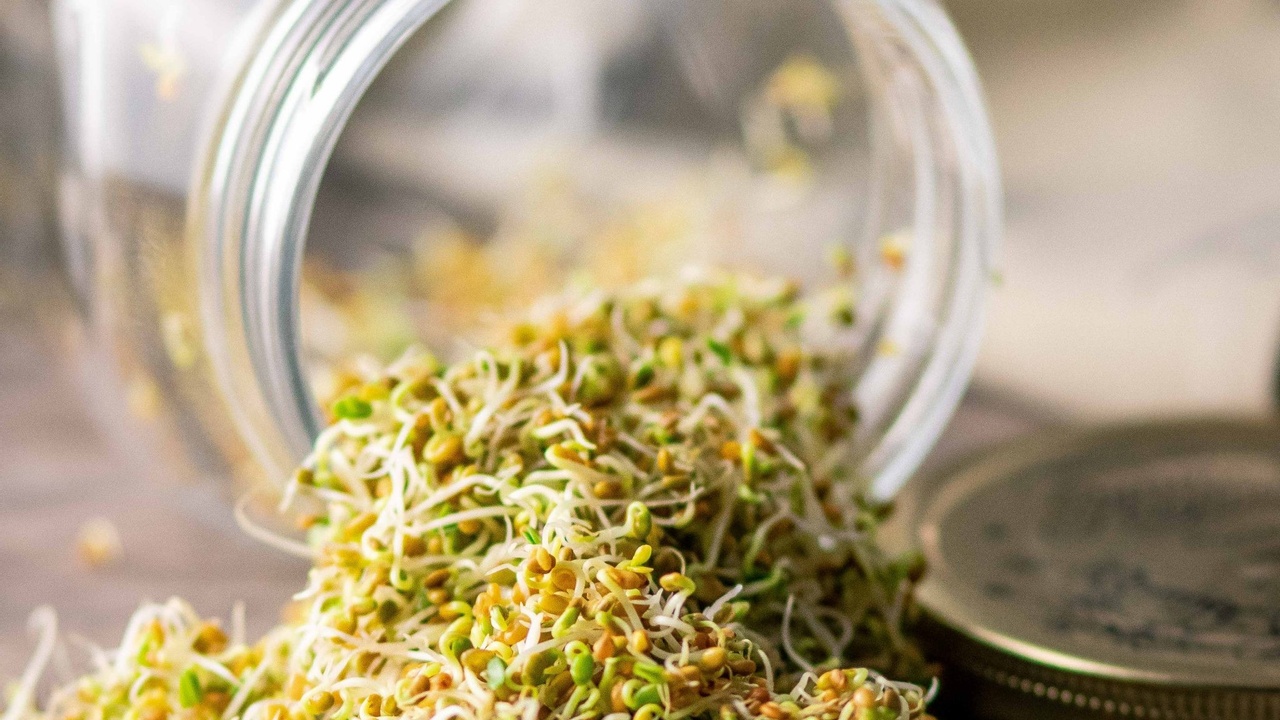How to Grow Alfalfa Sprouts, And Why!
Apr 13, 2021
How and why to sprout alfalfa
Have you ever made your own alfalfa sprouts at home?
If not, you’ve missed out on a delicious, healthy and easy-to-prepare addition to your salad bowls, sandwiches, and spreads.
The good news is, you can get started right away to add this fresh and flavorful superfood into your life. All it requires is having the seeds, some water, a little bit of time and the right procedure to follow.
They have a refreshing, mild, a slightly nutty taste and can add some exciting crunch and texture to your dishes. The little green leaves combined with the bright white stem also add a colorful element on your dishes and the sprouts can be used as a garnishing element.
What are alfalfa sprouts and why are they so healthy?
Alfalfa sprouts are the little shoots of the alfalfa plant that begin to grow when the seeds germinate. They have a long and thin white shoot that ends in a few tiny green leaves. It is believed that they’ve originated in central and Southern Asia where they are found in various dishes, but they have become a popular food all over the world.
Alfalfa sprouts are low in calories, 100 g just contain about 23 calories in total. The same amount of sprouts also carries 35% of your daily recommended vitamin K and 14% of your vitamin C intake. They also contain moderate amounts of essential minerals, such as folate, manganese, copper, and phosphorus.
Eating more alfalfa sprouts could help to prevent osteoporosis because of its relatively high vitamin K content. Vitamin K helps your body to correctly use calcium which is imperative for building strong bones (1). Consuming alfalfa sprouts also might help to lower your blood sugar levels (2). They are also believed to have a cholesterol-lowering ability due to its high content of saponins (3).
Be aware though – if you’re pregnant, take blood thinners, or have a compromised immune system or autoimmune disease, you should avoid alfalfa sprouts (4). They could potentially be spoiled by bacteria if not grown and stored correctly. This could happen when buying alfalfa sprouts in stores, for example.
How to make your own alfalfa sprouts
Making your own alfalfa sprouts at home is very easy. All you have to do is:
-
Soak the seeds
-
Rinse/drain the seeds each day
-
Harvest the seeds
Here’s a little overview.
Soaking – 8 to 12 hours
Rinsing – 2 times per day (morning and evening)
Harvest – 4-5 days (depending on season and temperature)
You simply have to buy the seeds, you can easily get them online or at organic supermarket.
Let’s look at each step individually.
Soaking the seeds
The first step is to soak the seeds in filtered water. Simply add the seeds to your container and let them soak for 8 to 12 hours. You can use any container you like, such as a bowl, but we recommend a flat, rectangular shaped container, which you later use for sprouting your seeds
Rinsing and draining
After the seeds have soaked, drain the water and rinse with fresh water. Place them back into your sprouting container. Repeat to rinse the sprouts two times per day, preferably in the morning and evening.
Having a flat sprouting container makes sure that the sprouts are spread out evenly and all get the same exposure to the air. This helps to prevent that too much water accumulates at the bottom. This could lead to spoilage.
They don’t need direct sunlight, so keep them somewhere in your room without having the sunshine on them.
Harvest
After 4-5 days, the seeds are ready to be harvested. You can tell that they’re done once the shoot has fully developed and small green leaves started to appear at the top.
It depends on your climate, season, weather, and temperature. In winter and in colder climates, the seeds might need 1-2 days longer as compared to summer or warmer climates. That’s why it’s important to look for the growth and appearance of the sprouts instead of just following a fixed number of days.
Always make sure to check for the smell and flavor of your sprouts to see if they might have turned bad.
Alfalfa sprouts should smell and taste pleasant and fresh.
And there you go. You can add the sprouts into salads, on top of your next sandwich, or as a garnish for almost any dish you choose.
Join Our Newsletter
Get the latest updates on new recipes, cooking tips, upcoming courses, and exclusive promotions.
We hate SPAM. We'll only send you valuable content, and you can unsubscribe anytime.



